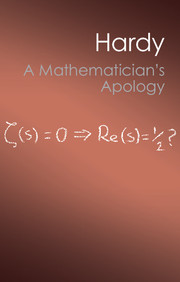27
Published online by Cambridge University Press: 05 August 2014
Summary
It may be objected that my concept of ‘utility’ has been too narrow, that I have defined it in terms of ‘happiness’ or ‘comfort’ only, and have ignored the general ‘social’ effects of mathematics on which recent writers, with very different sympathies, have laid so much stress. Thus Whitehead (who has been a mathematician) speaks of ‘the tremendous effect of mathematical knowledge on the lives of men, on their daily avocations, on the organization of society’; and Hogben (who is as unsympathetic to what I and other mathematicians call mathematics as White-head is sympathetic) says that ‘without a knowledge of mathematics, the grammar of size and order, we cannot plan the rational society in which there will be leisure for all and poverty for none’ (and much more to the same effect).
I cannot really believe that all this eloquence will do much to comfort mathematicians. The language of both writers is violently exaggerated, and both of them ignore very obvious distinctions. This is very natural in Hogben's case, since he is admittedly not a mathematician; he means by ‘mathematics’ the mathematics which he can understand, and which I have called ‘school’ mathematics. This mathematics has many uses, which I have admitted, which we can call ‘social’ if we please, and which Hogben enforces with many interesting appeals to the history of mathematical discovery.
- Type
- Chapter
- Information
- A Mathematician's Apology , pp. 136 - 138Publisher: Cambridge University PressPrint publication year: 2012



